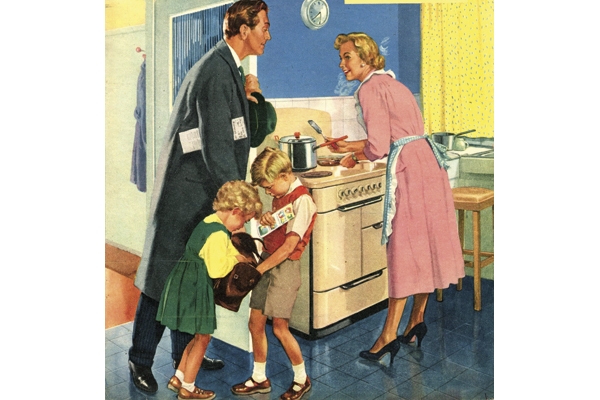In 2009 a magazine survey found that many women in their twenties wanted to stay at home baking while their husbands went out to work: ‘I’d love to be a captive wife.’
Jessica Mann’s thoughtful and emphatic book is a riposte to this, an overview of the Fifties, which she calls a polemic and a personal memoir, winding together fact and opinion with her own experience of being, first a teenager and then a young woman at that time. The result is a richly readable and persuasive piece of work. I found myself reverently ticking the notes I took (‘Yes! Yes!’) while being reminded of aspects of those days I had forgotten — or sublimated.
Mann is the daughter of German Jewish parents who came to this country in the early Thirties, and she was briefly evacuated (without them) to America at the start of the war — a child of the times in every sense. She went on to Cambridge, married an archeologist, had four children, as well as a distinguished career not just as a writer but also as a public figure, being a member of numerous quangos.
So she is a woman who has successfully defied the obstacles that were in the way of all women half a century ago (and even subsequently). But her objective is to dispel any image of the Fifties as an appealing domestic utopia for women, and she has succeeded in hauling that often grimy era into the daylight, and pointing out the frustrations of many young wives like herself. The title is a bow to the feminist Betty Friedan’s The Feminine Mystique, which spoke out on problems which many women were afraid to admit.
Grimy. Oh dear me, yes — literally as well as metaphorically. Those born after the Clean Air Act of 1956 can have no idea of how it was to have perpetually dirty hands, and houses in which every surface became greasily grey again after each day. Household management was drudgery: no fridge, washing machine, dryer or vacuum cleaner. And with the beloved babies came the stinking nappy bucket, the endless washing by hand, the kitchen festooned with damp terry-towelling.
Mann is excellent on telling detail, from domestic filth to the prevailing cuisine: ‘starchy, stodgy, underseasoned and overcooked.’ I too remember the thrill of meeting my first avocado, let alone exotic food from abroad. My husband and I courted in Oxford’s earliest Chinese restaurant, and to this day sweet and sour pork is imbued with romance.
But the deprivations of daily life were the least of it, in a sense. More potent still was the moral climate of that time: ‘a society defined by inhibitions and hierarchies’. It was a world in which many things were unmentionable, among them menstruation, homosexuality and cancer — all those defining aspects of existence brushed under the carpet, spoken of in whispers, if at all.
Mann concedes that the candour of today may have gone too far, when children know more about sex than a young bride might have in 1950, and teenage girls now swear as liberally as squaddies. We seem to have leapt, in 50 years, from almost Victorian constrictions to an all-pervading liberalism. Except, of course, that the new social straitjacket is politial correctness; the old racism and anti-Semitism may have been outlawed, but instead we have the quicksands of inappropriate reference.
I had forgotten the Fifties’ gossip columns featuring quite so many dukes and duchesses — a different kind of hierarchy to the ‘celebrities’ of today — and also the tacit censorship exercised by women’s magazines, which were concerned only with clothes and cookery. We accepted so much: the hypocrisy and the constraints. Mann illustrates this with her own guilt at not having felt absolutely content as a housebound young mother; she wasn’t accepting, but she felt that she should have been.
This is a short book, shrewdly argued, and with a satisfying but unobtrusive ballast of reading and research. It complements the big academic works by Peter Hennessy and David Kynaston. Everyone under 40 should read it, women in particular. Ladies, you don’t want to go back there; make cupcakes for fun if you want to, but give thanks for equality of opportunity, for the pill, domestic appliances, supermarkets and cheap clothing. Forget the captive wife fantasy. Dump misplaced nostalgia. And remember, as Jessica Mann would say, that the price of women’s liberation is eternal vigilance.





Comments